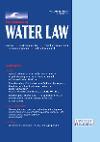Journal of Water Law - Volume 28 - Issue 4

ARTICLES
Special administrations in the water industry – to pull the plug or to save from drowning?
BO XIE
Lecturer in Law, Dundee Law School
SARAH HENDRY
Professor, Dundee Law School and the Unesco Centre for Water Law, Policy and Science, University of Dundee
This article argues that the crisis in the UK water sector reflects both regulatory failures and an unsustainable, highly-leveraged capital base. It assesses the structure for the economic regulation of the industry and analyses the options in the event of a business failure, considering in particular the recent reforms to the water industry special administration regime in England. The authors conclude that the new rules could facilitate a better approach to balancing the interests of the public, the regulators, the service providers and the different classes of investors.
Transboundary EIA for Western Balkans Hydropower: Montenegro’s Buk Bijela case under the Espoo Convention
PAUL STANTON KIBEL
Professor Emeritus of Water Law, Golden Gate University School of Law, California
MAJA KOSTIC-MANDIC
Professor of International Environmental Law and Public International Law, University of Montenegro
In 2020, Montenegro filed a submission with the Implementation Committee of the United Nations Espoo Convention on Transboundary Environmental Impact Assessment (‘the Espoo Convention’). Montenegro’s submission raised concerns about shortcomings in the environmental impact assessment (‘EIA’) prepared by Bosnia and Herzegovina for the Buk Bijela hydropower project on the Drina River, including the adequacy of assessment and mitigation of adverse transboundary fishery impacts on Durmitor national park located in Montenegro upstream of the proposed dam, and the absence of cumulative assessment of fishery impacts from other hydropower projects in the Drina River watershed. In December 2023, in response to the submission to the Implementation Committee, the parties to the Espoo Convention issued a decision ordering Bosnia and Herzegovina to prepare a revised expanded transboundary EIA in consultation with Montenegro before proceeding with the Buk Bijela project. The case establishes new precedent regarding the requirements of adequate transboundary EIAs, particularly in regard to hydropower projects with adverse fishery impacts.
Shared rights, shared costs? The question of water infrastructures in international water law
AGNES CHONG
Assistant Professor, Chinese University of Hong Kong
To what extent does a state’s right of equitable utilisation entitle it to benefits from the water infrastructures of its neighbours? This article examines this question with reference to the Silala decision, which, of all the international court decisions, highlights the issue most accurately. The article also draws from the general international law jurisprudence on canals/channelisation as well as non-navigational uses of watercourses. It argues that notwithstanding the ‘practice gap’, international law permits riparian states to enter into discussions on the costs and benefits of water infrastructure investment and the absence of cooperation arrangements or agreements does not preclude states from deciding this issue on a bilateral or multilateral basis. It also contributes to thewider discussion about how international law can address channelisation of water resources through cooperation.
CASE COMMENTARY
Opening the sewer-gates: an exploration of the Supreme Court’s decision in Manchester Ship Canal Company Ltd v United Utilities Water Ltd (No 2)
ARMIN SOLIMANI
Barrister, FTB Chambers, London
The long-awaited judgment from the UK Supreme Court confirms that a sewerage undertaker’s failure to properly flush the sewers is in principle susceptible to nuisance claims by affected riparian rights-holders, even absent an allegation of negligence. The granting of an injunction or damages to remedy discharges onto watercourses, rather than onto land as was the case in Marcic, was held to be consistent with the statutory scheme of the Water Industry Act 1991.
UK NEWS
Disclosure of information relating to sewage pollution
